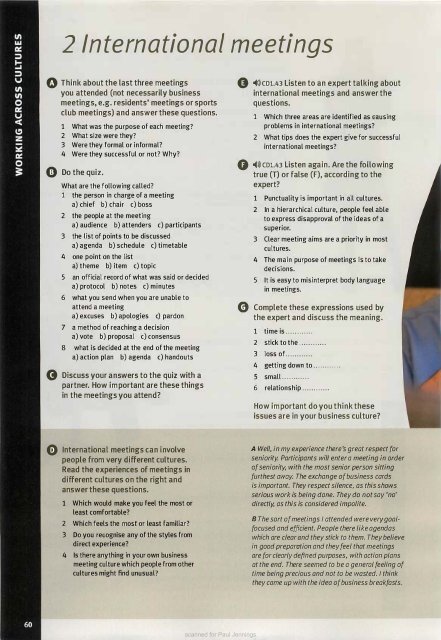Market Leader Intermediate 3rd edition SB
You also want an ePaper? Increase the reach of your titles
YUMPU automatically turns print PDFs into web optimized ePapers that Google loves.
2 International meetings<br />
o Think about the last three meetings<br />
you attended (not necessarily business<br />
meetings, e.g. residents' meetings or sports<br />
club meetings) and answer these questions.<br />
1 What was the purpose of each meeting?<br />
2 What size were they?<br />
3 Were they formal or informal?<br />
4 Were they successful or not? Why?<br />
o Do the quiz.<br />
What are the following called?<br />
1 the person in charge of a meeting<br />
a} chief b} chair c} boss<br />
2 the people at the meeting<br />
a} audience b} attenders c} participants<br />
3 the list of points to be discussed<br />
a} agenda b} schedule c} timetable<br />
4 one point on the list<br />
a} theme b} item c} topic<br />
5 an official record of what was said or decided<br />
a} protocol b} notes c} minutes<br />
6 what you send when you are unable to<br />
attend a meeting<br />
a} excuses b} apologies c} pardon<br />
7 a method of reaching a decision<br />
a} vote b} proposal c} consensus<br />
8 what is decided at the end of the meeting<br />
a} action plan b} agenda c} handouts<br />
G Discuss your answers to the quiz with a<br />
partner. How important are these things<br />
in the meetings you attend?<br />
o )>> C01.43 listen to an expert talking about<br />
international meetings and answer the<br />
questions.<br />
1 Which three areas are identified as causing<br />
problems in international meetings?<br />
2 What tips does the expert give for successful<br />
international meetings?<br />
o C01.43 listen again. Are the following<br />
true (T) or false (F), according to the<br />
expert?<br />
1 Punctuality is important in all cultures.<br />
2 In a hierarchical culture, people feel able<br />
to express disapproval of the ideas of a<br />
superior.<br />
3 Clear meeting aims are a priority in most<br />
cultures.<br />
4 The main purpose of meetings is to take<br />
decisions.<br />
5 It is easy to misinterpret body language<br />
in meetings.<br />
o Complete these expressions used by<br />
the expert and discuss the meaning.<br />
1 time is ....... .<br />
2 stick to the .<br />
3 loss of. .......... .<br />
4 getting down to ..<br />
5 small<br />
6 relationship<br />
How important do you think these<br />
issues are in your business culture?<br />
e International meetings can involve<br />
people from very different cultures.<br />
Read the experiences of meetings in<br />
different cultures on the right and<br />
answer these questions.<br />
1 Which would make you feel the most or<br />
least comfortable?<br />
2 Which feels the most or least familiar?<br />
3 Do you recognise any of the styles from<br />
direct experience?<br />
4 Is there anything in your own business<br />
meeting culture which people from other<br />
cultures might find unusual?<br />
A Well, in my experience there's great respect for<br />
seniority. Participants will enter a meeting in order<br />
of seniority, with the most senior person sitting<br />
furthest away. The exchange of business cords<br />
is important. They respect silence, as this shows<br />
serious work is being done. They do not soy 'no'<br />
directly, as this is considered impolite.<br />
8 The sort of meetings I attended were very goal·<br />
focused and efficient. People there like agendas<br />
which are clear and they stick to them. They believe<br />
in good preparation and they feel that meetings<br />
are for clearly defined purposes, with action plans<br />
at the end. There seemed to be a general feeling of<br />
time being precious and not to be wasted. I think<br />
they come up with the ideo of business breakfasts.<br />
scanned for Paul Jennings


